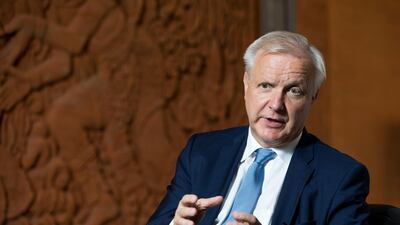The European Central Bank could start raising interest rates about a year from now if the euro-zone economy develops as policymakers currently expect, governing council member Olli Rehn said on Thursday.
Speaking a week before the next policy meeting, Mr Rehn said financial markets seem well-aligned with the central bank's guidance, which foresees borrowing costs staying at record low levels through the summer of 2019.
"Markets appear to be reading the ECB's forward guidance correctly," Mr Rehn said. "The starting point should be that if the economy develops roughly in line with the current outlook, the first rate increases would take place in the final quarter of 2019."
His comments come as the ECB prepares to cap its bond- buying programme by the end of the year, according to Bloomberg, and will feed into the debate over the exact timing of rate lift-off. Dutch governor Klaas Knot raised the possibility earlier this month that officials may consider speeding up the process of removing their extraordinary stimulus if the euro-zone economy evolves in line with projections.
Mr Rehn said policy must remain stimulative as core inflation hovers around 1 per cent. While headline inflation is fluctuating around 2 per cent, that's largely driven by energy prices.
He said the governing council has yet to discuss its strategy for reinvesting proceeds from maturing debt under quantitative easing, but the decision will be taken in the coming months. In any case, reinvestment of government and corporate debt will continue for "quite a long time." Mr Rehn also joined in criticism of the 2019 budget draft that Italy's populist government sent to Brussels earlier this week.
The plan, which foresees a deficit three times the previous government's projection, was criticised late Wednesday by Bundesbank president Jens Weidmann, who said the euro zone's third-largest economy should focus on reducing its huge debt pile.
_______________
Read more:
European Central Bank cannot rescue Italy without EU bailout, sources say
Euro likely to stay weak against dollar until mid-2019
_______________
Separately, Ewald Nowotny, governor of Austria’s central bank, said if German Chancellor Angela Merkel really has given up on backing Mr Weidmann to succeed Mario Draghi as European Central Bank chief, that’s a mistake.
"I would have welcomed Weidmann's candidacy" for ECB president, Mr Nowotny said in an interview with Oberoesterreichische Nachrichten. "I consider it a serious political mistake by Angela Merkel that she is no longer pursuing Mr Weidmann's candidacy. It would be good if someone from the largest economy in the euro zone heads the ECB."
Mr Draghi's job will become available at the end of next October, Reuters said. By that time Mr Nowotny - a moderate policy hawk who has often sided with Mr Weidmann - will have left his post too.
"I would have welcomed a candidacy of Weidmann very much," said Mr Nowotny.
Mr Nowotny’s comments highlight the difficulty in reading Mrs Merkel’s strategy to secure one of many upcoming top European jobs for a German. Mr Weidmann, long seen as the front runner to succeed Mr Draghi when his term expires in October 2019, fell back in the pack of contenders after she apparently decided to prioritise the European Commission’s top post.
Common wisdom would suggest that Germany couldn’t also claim the presidency of the ECB, which hasn’t had a German leader in its 20-year history.
Mrs Merkel acknowledges she can’t have it both ways, but has also insisted that pushing for Mr Weidmann isn’t ruled out. According to the chancellor, the road to certainty is “endlessly long”.

